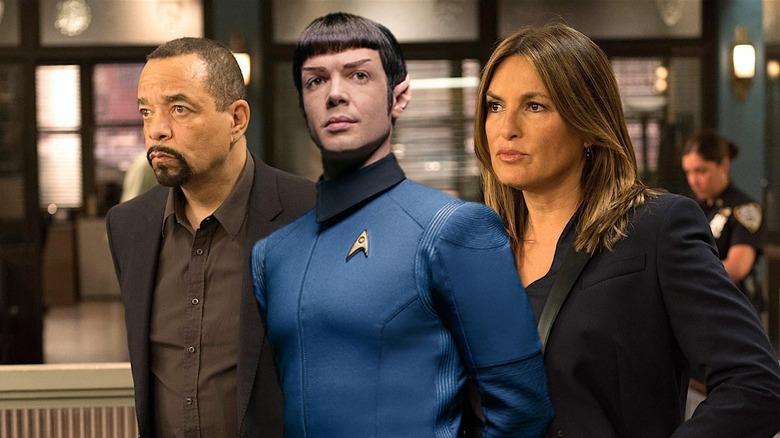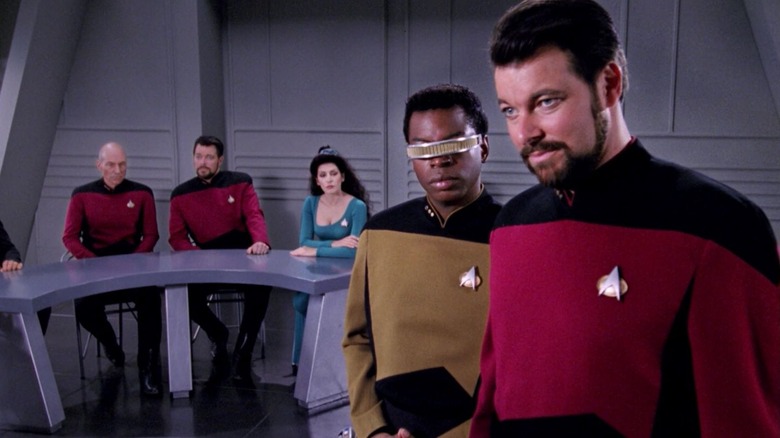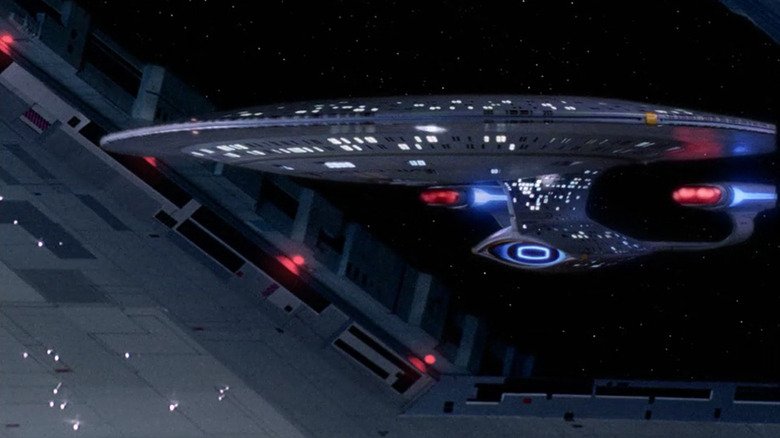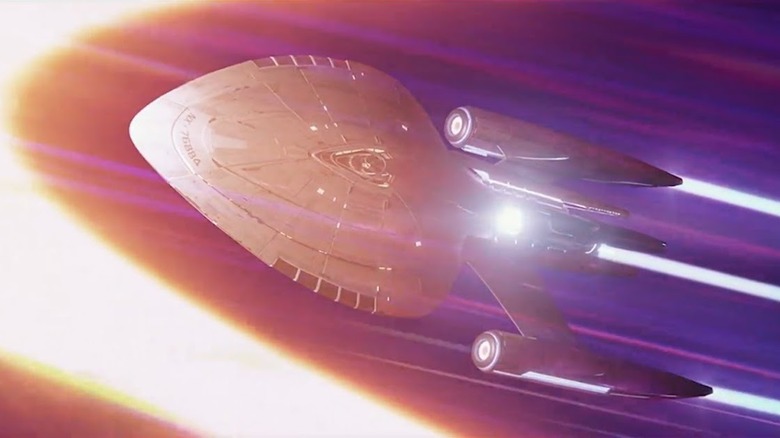Star Trek's Closest TV Cousin Isn't Sci-Fi – It's Law & Order
As of this writing, the "Law & Order" TV empire incorporates 65 seasons of television, providing 1,355 episodes in total. If you're staying in a hotel anywhere in the world, you can probably turn on your TV and flip only three channels in either direction before you'll come upon a "Law & Order" rerun. It is ubiquitous and eternal, and it has become the ultimate "comfort watch" for a populace hungry for, well, law and order.
While "Law & Order" may feature multiple beloved characters who will stay on their respective shows for many years, they tend to rotate out when a given actor wishes to retire. The shows rarely suffer from multiple, frequent cast changes, however, and they're able to keep telling interesting stories without the benefit of a particular character's point of view. Each character might bring a gruff je ne sais quoi to the series, but after airing for decades, it's become very clear who the real main character is: the criminal justice system itself.
"Law & Order" is comforting to watch because it depicts a criminal justice system operating the way Americans think it does. A criminal commits a crime, and they are apprehended by the police halfway through the episode. Then, in the show's second half, hardworking and intelligent district attorneys swiftly prosecute them. The criminals are jailed in an hour's time, and everything happened swiftly and neatly. Sometimes the bad guys get away, of course, but that was to point out loopholes in the system, loopholes that can now presumably be closed. We love "Law & Order" because the bureaucracy always functions.
That revelation, it seems, is also a way to look at "Star Trek." The main characters of "Star Trek" aren't the officers on board Starfleet vessels. The main character is ... Starfleet itself.
These are their stories
Trekkies of a certain age may recall when "Star Trek: The Next Generation" debuted in 1987. In the media blitz leading up to the show's premiere, many old-school Trek fans expressed consternation that the new series wouldn't work. For many, "Star Trek" couldn't exist without the characters of Captain Kirk (William Shatner), Spock (Leonard Nimoy), and Dr. McCoy (DeForest Kelley) on board the starship Enterprise. "Next Generation" was to take place a century after the events of the original "Star Trek," and was set on board a brand-new Enterprise with an all-new cast of characters. Certain Trekkies felt that "Star Trek" was a character-based series, and that changing the characters was constitute a heretical and fundamental alteration of what made the show work.
"Next Generation" eventually proved to be just as dynamic and exciting as the original show, and it would go on to run for seven seasons. It might also be considered a "purer" version of "Star Trek," given that creator Gene Roddenberry was a lot clearer in what he wanted out of his series, namely: he wanted to up the diplomacy quotient and assure characters never bickered. Everyone, he felt, could get along this time.
"Next Generation" was so popular that two additional spinoffs launched in the 1990s: "Star Trek: Deep Space Nine" in 1993 and "Star Trek: Voyager" in 1995. Both of those shows were contemporaneous with "Next Generation," and both featured crossover episodes with it.
This glut of "Star Trek" in the 1990s introduced Trekkies to a slew of new, interesting characters, but it started to highlight what might have always been true: it doesn't matter who commands a starship, necessarily. It just matters that Starfleet officers do their job well. Starfleet principles are the star.
It doesn't matter who commands a starship, it only matters that the starship is running well
It's worth noting that every "Star Trek" series to date (with the exception of "Star Trek: Picard") is set on board a traveling Starfleet vessel on a mission to trek through the stars. Most of the main characters on "Star Trek" are officers on board said ship, members of a space navy devoted to exploration, science, and expanding the minds of humanity. They wear uniforms and try their hardest to live up to diplomatic, egalitarian principles. They are keen to ply their intelligence and engineering acumen to face dangerous cosmic threats and smooth over the aggressions of warlike enemies.
They are, at the end of the day, devoted to law and order.
An appealing aspect of Starfleet — and, by extension, all "Star Trek" — is that they are a massive, well-functioning bureaucracy. The captains on each show are devoted to peace and abide by a rigidly structured command hierarchy that they rarely break. The chief engineer takes care of the engines. The chief medical officer runs sickbay. The captain is the world's best manager and has a team of employees who carefully delegate. "Star Trek" makes dry managerial spreadsheets a vital part of maintaining its technological, post-war, post-scarcity utopia. When everything works well, it's exhilarating.
As such, we Trekkies are not necessarily here to see Captains Kirk, Picard (Patrick Stewart), Sisko (Avery Brooks), or Janeway (Kate Mulgrew) specifically. We're here to see many people working hard in a cool-ass workplace, all of them abiding by the functional, well-established rules of Starfleet.
Strong characters help any drama, of course, but with "Star Trek," as with "Law & Order," the System is king.
The expanded universe
It's also important to remember that "Star Trek" established early on that its universe is much larger than anything audiences got to see. When a "Star Trek" series ended, it was rarely final, implying that the characters would continue to have adventures that we, the audience, simply weren't allowed to see. Captain Picard may have been the captain of the Federation flagship, but there were hundreds of other Starfleet vessels out there in the galaxy, each presumably having adventures all its own. It could be argued that Trekkies invented this kind of "expanded universe" canon, filling our heads with a vast and complicated network of adventures that we only occasionally glimpsed.
The thing binding together all those adventures, though, was Starfleet. The rules of the space navy, the hierarchy of rank, the technical specifications of each ship, and the way the crew functioned — all of the things that defined Starfleet — were going to be present, no matter the "Star Trek" show, book, or movie. We Trekkies merely wanted to see more and more officers comfortably within the future version of the "Law & Order" criminal justice system.
Of course, there is a general appeal toward any show that depicts professionals devoted to professional acumen. This might be why stories of killer spies or assassins are so popular; we like to see people doing their jobs well, even if that job is murder. "Star Trek" is mostly about professional people doing their jobs well, living in a system that functions near-perfectly.
"Law & Order" is the same. We're here to witness a fantasy of the system working as it should. Lord knows it doesn't always in real life.



